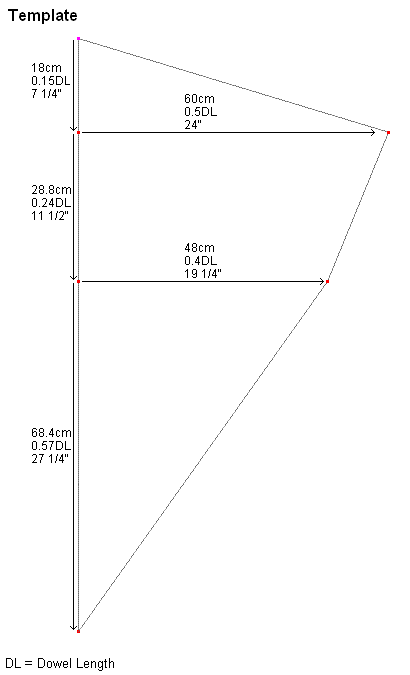- Home Page
- Better Kites
- ... Diamond Kite
How to Make a Diamond Kite
Step by Step—Page 1 of 3
The MBK Dowel Diamond
This set of instructions on how to make a diamond kite assumes you know absolutely nothing about kite making. You might already have some of the simple tools and materials required.
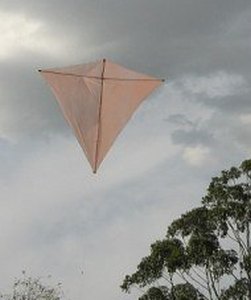 MBK Dowel Diamond
MBK Dowel DiamondAnything you don't have is easily bought. If it's not exactly what I used, then at least something pretty similar!
The Dowel Diamond is a fairly large tailless kite, inspired by the famous Eddy design. However, it will still fit into nearly all road vehicles, ready to fly—either just in front of the rear seat or flat in the trunk (boot).
This design is a great very-light-to-light-wind flier.
Setting up on the flying field is just a matter of attaching the bow-line toggle to put some curve into the horizontal spar. Then the flying line is attached to the bridle.
At this point you are ready to launch! The method of attachment is illustrated further down this page.
I have chosen to make "One Dowel Length" equal to 120 cm for every kite in the Dowel Series. If you are in North America, 48 in. of 3/16 in. dowel is close enough to 120 cm of 5 mm dowel. This will result in a kite with similar flying characteristics to my original. Make sure to find a hardwood type for your dowel.
On this site, there's more kite-making info than you can poke a stick at. :-)
Want to know the most convenient way of using it all?
The Big MBK E-book Bundle is a collection of downloads—printable PDF files which provide step-by-step instructions for many kites large and small.
That's every kite in every MBK series.
How to Make a Diamond Kite
Cutting the Sail
Now's the time to read up on the kite-making tools and materials required for making a Dowel Diamond, if you haven't already.
The template shown above represents one side of the kite sail. You will now transfer these measurements to the sail plastic. (You will notice that the photos show a slightly different shape—but stick to the template measurements!)
Like to see a video clip? Just scroll down to near the end of this page.
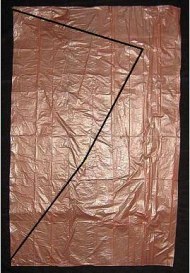
- First, take a large bag that will fit the entire template shape within one side, and lay it flat on the floor.
- Mark dots on the plastic, corresponding to the corners of the template. There is no need to use a T-square, since any small error will be duplicated on the other side of the sail.
- Using the marking pen, rule lines between the dots as in the photo. For lines longer than the ruler, just add a few extra dots using one of the dowel spars as a ruler! Then it's easy to connect the dots. It's probably best not to rule the whole line with the dowel, since it bends easily.
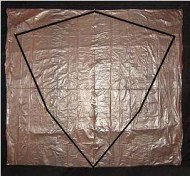
- Flip the plastic bag over, and trace over all the black lines using your marker pen and ruler.
- Cut out a rectangular section of the bag containing the kite sail, open it out, and lay it flat on the floor; you can now see the complete sail outline as in the photo.
When doing the following, most of the width of the tape should be inside the kite's outline.
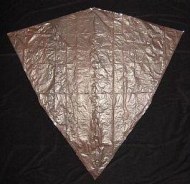
- Use a single length of tape for each line. Hold it out straight; touch it down to the plastic at one end then at the other end; dab it down in the middle then press down all along its length.
- Lay clear sticking tape along all the lines, letting it overlap at the corners.
- With scissors, cut along all the black lines. This will leave most of the width of the sticking tape inside the sail outline. See the photo.
As mentioned earlier, there's more kite making on this site than you can poke a stick at. :-)
Want to know the most convenient way of using it all?
The Big MBK E-book Bundle is a collection of downloads—printable PDF files which provide step-by-step instructions for many kites large and small.
That's every kite in every MBK series.

